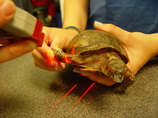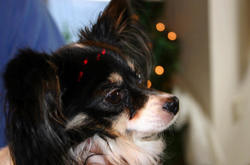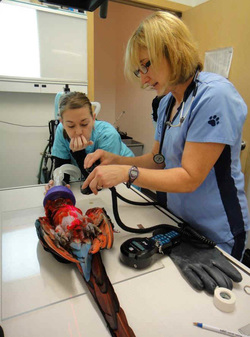Erchonia Laser

CHICAGO EXOTICS PROUDLY OFFERS LASER THERAPY BY APPOINTMENT!
Veterinary Cold Laser Therapy & Your Pet
Low Level "Cold" Laser Therapy has been used consistently and successfully on human athletes for many years. It has become a mainstay in professional sports where fast healing is not just desirable but necessary to remain competitive.
Veterinary Cold Laser Therapy & Your Pet
Low Level "Cold" Laser Therapy has been used consistently and successfully on human athletes for many years. It has become a mainstay in professional sports where fast healing is not just desirable but necessary to remain competitive.

Veterinary Cold Laser Therapy, or VCLT, has more recently entered the veterinarian world as a unique, effective therapy. The VCLT technique has been shown to help in treating arthritis pain, to accelerate wound healing, and to reduce acute tissue inflammation. By using this high technology instrumentation, treatment is non-invasive and state of the art.
VCLT involves the use of Low Level "Cold" Laser Therapy at a specific frequency to stimulate healing. Light Amplification by Stimulated Emission Rays or LASER, is a safe, highly concentrated coherent light which can be altered to attain many different outcomes. It is a natural and biological therapy which uses light to restore health to ailing cells.
VCLT involves the use of Low Level "Cold" Laser Therapy at a specific frequency to stimulate healing. Light Amplification by Stimulated Emission Rays or LASER, is a safe, highly concentrated coherent light which can be altered to attain many different outcomes. It is a natural and biological therapy which uses light to restore health to ailing cells.

VCLT uses a wavelength different from "hot" lasers that are used for hair removal, surgical and other therapeutic instruments that heat tissue, making it a very specialized modality. The technology of Low Level Laser Therapy integrates biology and quantum mechanics. In layman terms, the cold laser is a biomodulator that will up-regulate or down-regulate the targeted area of the body by the use of coherent light at a precise wavelength. The laser light communicates to the cells stimulating them to heal themselves, grow, change, and survive. The beams are red in color, and some lasers have multiple beams programmed at specific frequencies to target the area of involvement, effected nerve root, lymph node drainage, brain, or other organs. The treatment allows for focus on the injury while also stimulating the brain. This allows for not only healing, but also neurological reorganization and reorientation at the brain level.
The RABBIT, FERRET, BIRD, RAT, as well as the dog, the cat, horse and any animal can all be adequately treated with this state of the art technology for a number of different disease conditions with healing equipment that does not even have to touch the animal’s body. The addition of Erchonia Medical's Low Level Laser is an important step in facilitating the road to optimizing your pet’s health.
Anesthesia is not necessary for laser therapy, but was used for this patient at another practice.
The RABBIT, FERRET, BIRD, RAT, as well as the dog, the cat, horse and any animal can all be adequately treated with this state of the art technology for a number of different disease conditions with healing equipment that does not even have to touch the animal’s body. The addition of Erchonia Medical's Low Level Laser is an important step in facilitating the road to optimizing your pet’s health.
Anesthesia is not necessary for laser therapy, but was used for this patient at another practice.
Frequently Asked Questions
Is Low Level Laser Therapy painful for my pet?
No, most animals do not feel anything. We have observed that pets acknowledge the light and in most cases an obvious relaxed state is achieved within a few minutes.
How is Low Level Laser Therapy administered?
The mechanics of how Low Level Laser Therapy is administered are based on the indication for use. The general process follows: the probe containing the laser diode(s) is held in place or moved gently over the treatment area at a distance of approximately 4" – 12."
How long does it take for the laser to heal or improve a condition?
Although this is determined by the application, progress is immediately evident. The number of sessions vary depending on the severity and chronicity of the disease process; the nature and characteristics of the specific ailment; the age and general health of the patient; and even nutrition level plays a role.
Are there any side effects?
Some animals (for example older birds) have obvious increased energy and mobility followed by a deep relaxed sleep.
Does Low Level Laser Therapy cause heat damage or cancer in the tissue?
No, low level laser by virtue of design is non-heat producing and does not alter the cell structure. The laser irradiation is non-ionizing which means it does not collect in tissue.
Are there any complications to the treatments?
There are no known or published adverse effects of Low Level Laser Therapy. Low level lasers are different than more publicized heat lasers that are used in many surgical procedures to cut, and cauterize tissue. Low level lasers do not have a thermal effect and are used to stimulate, rather than destroy tissue. These types of lasers have been in use for well over 25 years and there has yet to be one recorded side effect.
What kind of care plans can be expected for laser therapy?
Treatment plans may vary depending on the condition. For instance, an acute soft tissue injury or open wound may require multiple short treatments initially then the interval between treatments will lengthen as the condition improves.
Ask your Veterinarian about the possible benefits of Low Level Laser Therapy for your pet today.

